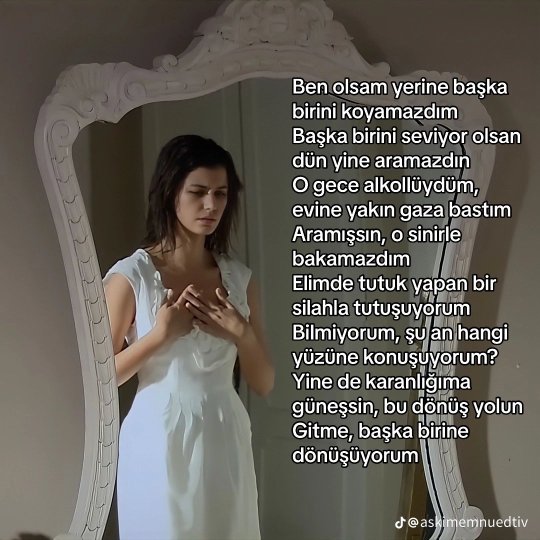#behlül
Text
23 notes
·
View notes
Text



Last Call for İstanbul - Serin&Mehmet
#beren saat#kıvanç tatlıtuğ#istanbuliçinsonçağrı#lastcallforistanbul#aşkı memnu#bihter ziyagil#bihteryöreoğlu#forbidden love#bihbeh#bihter#behlül#aski memnu
21 notes
·
View notes
Text

#Bihter (2023)#Bihter 2023#Bihter#farah zeynep abdullah#boran kuzum#Behlül#Bihter ve Behlül#Bihter and Behlül
9 notes
·
View notes
Text
Aşk-ı Memnu: Attempting a Pre-lapsarian Reading
@faintingheroine I’m so so glad that you introduced me to this book, and a lot of this analysis will be heavily influenced by you and your thoughts. We discussed pre-lapsarian readings quite a lot, but I wanted to see if I could give it a proper treatment. The translation I’m using can be found here.
The main concept of the argument hinges on the names of Adnan Bey and Firdevs Hanım: Adnan’s name meaning ‘the one who achieves immortality in heaven/Eden’ and Firdevs’ name meaning ‘Heaven’/’Paradise’.
Aşk-ı Memnu means ‘Forbidden Love’, and it’s possible to view love itself as the forbidden fruit of this Fall, or rather, collection of Falls. In Adam and Eve’s original tale, Adam’s love for Eve is sometimes viewed as the cause of his Fall, and he is blamed for being seduced, transferring agency to him rather than Eve.
To take the story first from Bihter’s perspective, Adnan is her Eden. She cannot create herself as an entire woman until she has escaped from her mother, but once she is in Eden, she is dissatisfied; ‘she want[s] such a love that it would leave an intoxicating faintness in her soul’. She feels the knowledge of love calling to her and Falls first not to Behlül (the one who laughs, but also not dissimilar in sound to Belial, another name for Satan— I cannot discover whether this tracks into Islam and the Turkish language, so I may be wrong to suggest this one), but to herself, when she makes that discovery of what love is:
Suddenly, in this semi-dark room, amid the slumbering silence of this house, as the tinted glass of the lamp above her head rained colourful shadows and seemed to enliven the furniture around her with an unfelt breeze, she shivered to find herself so naked, and feared the loneliness. No, this was such an emotion that it was closer to shame than to fear. She was ashamed, as if she had done a great wrong, ashamed that she had sinned unthinkingly against her virtue. She had fallen into the arms of an unknown lover who entered the privacy of her chamber secretly, and her first sin of passion had been committed in an irresistible nervous trembling. (Chapter 8)
Note how the room is ‘semi’ dark, how Bihter has been standing in the window, occupying liminal spaces that could represent her in-between state, the precipice of the Fall.
Bihter’s second Fall is more traditional. Behlül becomes a tempter, as he has tried and failed with Peyker, but unlike Satan, he lacks magnitude. He is opportunistic, casual. His Falls are more like flights of fancy and his temptations are boyish, almost innocent. They are in the room that serves as an entryway to his bedroom, neither completely sequestered in his private quarters, nor in the general space of the house and much of the action between them takes place in this in-between space. ‘[T]he red eyes of the stove were lowering their eyelashes’; ‘white snowflakes were falling’ (emphasis mine); Bihter is Falling.
The second Fallen figure I would like to consider is Behlül himself. Behlül is not someone who Falls once or twice, but someone who seems doomed to Fall over and over again. He seems to Fall for almost every woman he meets, but his two particular Falls are for Bihter and Nihal.
In a second Behlül had gone so far that it was now no longer possible to turn back (Chapter 10)
At last, the little love stories of his life had been closed, now a long love story, with all its passions, desires, fevers, happinesses, had begun. He was finding all the old memories petty, lowly. They had become like rough drafts that had been scribbled over as a child, which one, embarrassed, wanted to tear out and throw away, to burn to ashes. Now he was going to write a perfect chapter of his love life, and after this chapter, he could end his love story. (Chapter 11)
He is insistent on the uniqueness of this, the irreversible romance of each Falling, yet his feelings for Nihal are almost identical:
Before this tableau of the old dream, he was thinking of his own life, of the life whose final page would perhaps be closed tonight, with one word from Nihal, of the life that would resemble just this view, turned into an abandoned ruin with its faded lines, its washed-out planes. Already that life seemed to have grown distant through an interval of long years; all those faces, even Bihter, all those memories belonging to yesterday, had been buried in the ruins of that old dream, far away, beyond such a wide sea. Now beside him, a fresh flower of hope was promising him the horizon of a new life with its shy glances. (Chapter 19)
He does not learn; after the close of the novel, it seems he may well have disappeared from Adnan Bey’s Eden to Fall again. He is a man; he may do so.
Last of the main three, but certainly not least, Nihal’s Fall is more complex and more gradual, less borne of single instants than Bihter and Behlül’s. The entire narrative encompasses her Fall, a Fall of a thousand moments. If Adnan Bey is Eden, then so too is Nihal’s childhood and his fatherly state. The more Nihal learns of love— at the wedding (noticeably we follow Nihal and the bride in that strange part of the day where the wedding has begun but the marriage has not, that precipice of Fall), by observing Bihter, by wearing sheets, by releasing Bülent, whose removal from the room is an acknowledgement of their adult genders— the more she edges towards her Fall. Even when she consents to marry Behlül, the Fall is not complete. It is not complete until she literally falls down those liminal stairs and lands at the bottom with Behlül and Bihter, the Fallen. She knows what love is; she knows what love can do. Adnan Bey carries her back upstairs, reclaims her for Eden, but this cannot last. The novel closes uneasily, ‘ a fear [...] passing through her mind’ as Nihal knows that Adnan Bey cannot live forever and she must one day leave Eden. She seems almost to resolve on death to escape passage into the next stage of life; a key parallel to Bihter.
I turn now to Firdevs. Is she not the epitome of the Fallen Woman? She Fell before the tale began, she seems determined to keep Falling until it kills her. Yet she is Paradise. What Paradise can this woman represent?
If my understanding is correct, Halit Ziya was familiar with Western traditions; likely familiar with Felix Culpa or the happy mistake. This is a view which suggests that the Fall is not actually a bad thing, but rather the only way humans could truly understand good and evil in the way God does and fulfil their destinies.
Firdevs has lived with her mistakes and she suffers for them, a kind of purgatory or barzakh. Perhaps she will attain Paradise because she is willing to live with herself in a way that Bihter and Nihal are not. It’s interesting that Behlül is the one most willing to sympathise with Firdevs; he is the one who leaves Eden and lives, the one who seems most likely to follow her path in life.
Bihter and Nihal will not wait for the Paradise of Heaven; they will not wait to become Firdevs. The Fall is too much for them and the loss of Eden too terrifying.
Beşir’s position in this reading is particularly interesting. He is the one who brings revelation, ‘the one who brings good news’. Ostensibly, the news is hardly good, but it is truth. He becomes almost a stand in for the God of Adnan Bey’s Eden. He even potentially redeems Nihal from her Fall, a Christ figure, sacrificed for the sins of the others.
Ultimately, it is not simply love that is forbidden, but knowledge of what it is to love. Nihal struggles against this knowledge and in the tragic conclusion, finally Falls. She can pretend to be firmly in Eden at the close of the novel but her knowledge is inescapable. She forbids herself from romantic love, tries to evade it, but the Fall must happen, and she cannot stall it forever.
#Aşk-ı Memnu#nihal#bihter#behlül#firdevs#adnan bey#halit ziya uşaklıgil#pre-lapsarian reading#or mid-lapsarian rather
28 notes
·
View notes
Text



Kıvanç Tatlıtuğ | New 💥
#kıvançtatlıtuğ#kıvanç tatlıtuğ#kivanc tatlitug#turkish actor#turkish series#turkish actress#actor#tv series#tvedit#turkishdreams#turkish man#turkishedit#tvgifs#turkey#my gif edit#usergif#gif edit#icon gif#kuzey tekinoglu#kuzey güney#kuzey tekinoğlu#cesur ve guzel#cesur ve güzel#aile#aslan soykan#askı memnu#behlül#new gif#new#edittv
4 notes
·
View notes
Text
Korkakların ismi dün Behlül'dü, bugün Ali Cabbar. Yarın da sen olursun merak etme
😘💅
#semaamagokyuzuolmayan#semamagokyuzuolmayan#semaamagökyüzüolmayan#sema#ali cabbar#emir can iğrek#emir can i─ƒrek#pop music#behlül#music
8 notes
·
View notes
Text
Bihter Ziyagil, rahat uyu... dünyanın en korkak adamını sen sevmemişsin...
#aşkı memnu#bihter#bihter ziyagil#behlül#aşık#aşk şarkısı#aşk#acı aşk#aşkım#aşk sözü#ayrılığın hediyesi#ayrılmak#postlarim#ayrılık#keşfet#aşk acıdır#özlem sözleri#şarkı sözleri#alınti#iyi geceler#dizi replikleri#diziler#short film#film#üzgünüm#seri üzgün#üzgün#blog post#my post
71 notes
·
View notes
Note
What did you think of Nihal and Behlül’s relationship? I am always of two minds regarding whether Nihal really romantically loved Behlül.
I think she really does love him in her way. But I agree with an earlier post of yours that it's less Behlül the man who she loves and more the idea of a husband who loves her exclusively and unconditionally when she feels abandoned by all her other loved ones. It reminds me of how Jo in Little Women says she would have married Laurie if he had proposed again (and actually resolves to marry him in the 2019 movie) just because she's so lonely now that all her sisters have either left home or died. There's also the fact that he's familiar to her, so their marriage would save her from being given away to a stranger.
It's interesting that she fixates on Behlül for these reasons, when she already has someone who loves her exclusively and unconditionally, and whom she knows well, and who isn't a blood relative or eight years older than she is: Beşir. But she can't appreciate it because he's a slave. Of course a relationship with him wouldn't have been healthy either, because she literally owns him, and wouldn't have lasted anyway because he's dying. Still, I can't help but think of the song "I'm All Alone" from the musical Spamalot, sung by King Arthur and his ignored servant Patsy: "But I'm alone"/"Oh, no you're not!"/"So all alone"/"I'm here, you twat!"
Meanwhile, I do think it's interesting that, womanizer though he is, Behlül genuinely thinks he loves first Bihter, then Nihal, and that each one will be his forever love. But the fact that he tires of Bihter so soon, comes to disdain her for committing the very sin that he's committing with her, only fixates on Nihal after he comes to view his affair with Bihter as something dirty, exaggerates Nihal's purity in his mind and expects it to redeem him, and runs off like a coward during Nihal's health crisis before Adnan Bey learns about the affair... none of this makes a good case for his "love" for either of them. Nihal's ending might be bittersweet, with an uncertain future, but she's definitely better off without him.
19 notes
·
View notes
Text
Aşk-ı Memnu book covers

Bihter and Behlül are just holding each other innocently, the third character highlighted is Adnan Bey who is for all intents and purposes a side character. Nihal is there upstairs but she is lost behind the writing of the author.
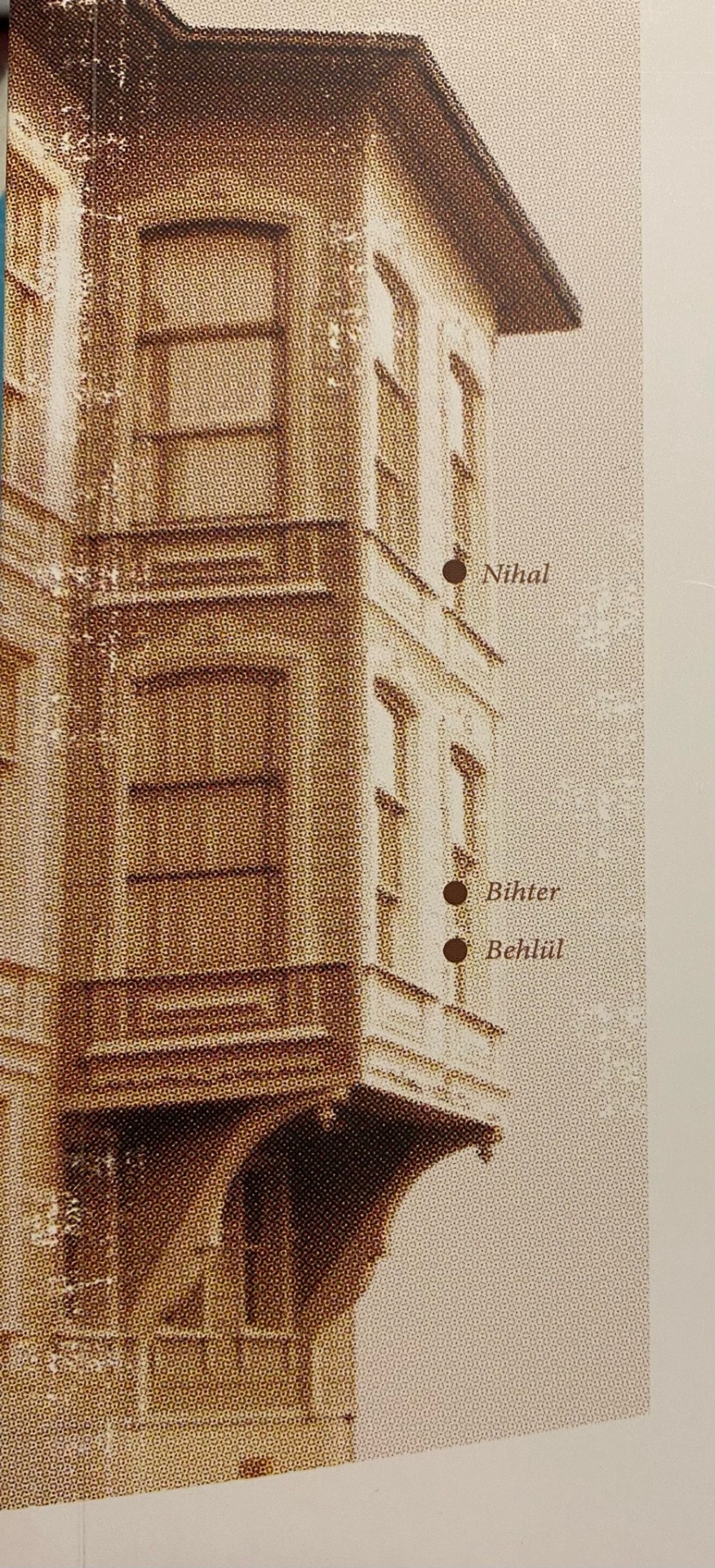
Bihter and Behlül could be doing anything, the third character highlighted is Nihal in her isolation and naivety.
The first cover is very good, but the latter is magnificent.
40 notes
·
View notes
Text

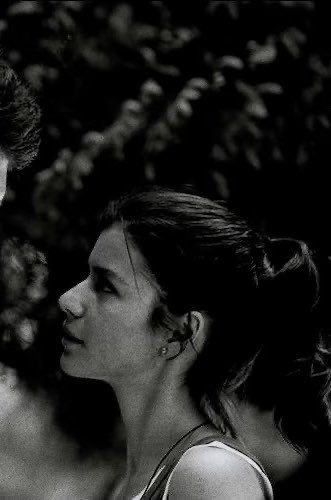
Seni çok özledim ama ben öldüm

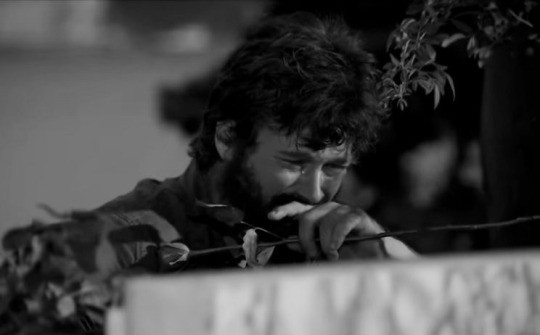

6 notes
·
View notes
Text
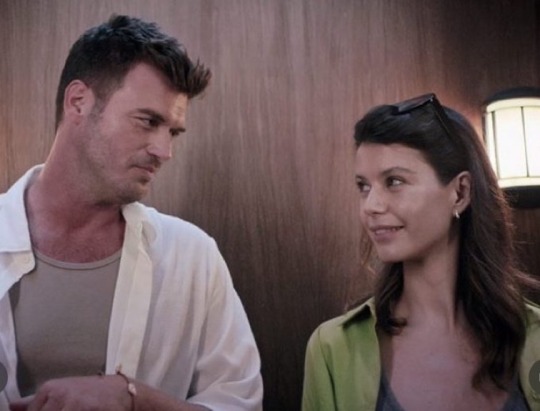


Beren Saat & Kıvanç Tatlıtuğ | Last Call of İstanbul
#beren saat#aşkı memnu#bihter ziyagil#bihteryöreoğlu#bihter#bihbeh#forbidden love#aski memnu#kıvanç tatlıtuğ#behlülhaznedar#behlül#lastcallforistanbul#istanbuliçinsonçağrı
21 notes
·
View notes
Note
I once asked this to @ariel-seagull-wings too but I will ask it to you too. What would be the favorite Shakespeare plays of Aşk-ı Memnu characters?
Nihal: I'm going to be a cop out and say Hamlet. She would probably self-identify with Ophelia or Desdemona type characters, but secretly feel connected to Hamlet himself in my head (I am probably repeating what @ariel-seagull-wings already said but I have purposely not read that post)
Bihter: I'm feeling Othello or maybe Macbeth? Bihter would definitely feel for Desdemona, but in my head she'd also identify with the way both she, Emilia and Lady Macbeth take their own happiness seriously. There's more assertive women in the comedies, but I'm not certain how Bihter would like those. She has her own melancholy to her, distinct from Nihal's.
Mlle de Courton: Much Ado About Nothing. A nice sweet rom-com with less scandal than usual, but still a fair amount.
Behlül: Depending on his mood, Anthony and Cleopatra (he thinks he's outgrown Romeo and Juliet) or A Midsummer Night's Dream for something more comical and sweet.
The only other person I can see having a strong association with Shakespeare is Adnan Bey and King Lear. I don't necessarily believe he'd enjoy the play, merely that he'd be affected by it. Now I am thinking that perhaps Nihal would enjoy this play, and see herself as a Cordelia figure.
#This was a really fun ask!#thank you#aşk-ı memnu#aşk ı memnu#nihal#bihter#behlül#mlle de courton#shakespeare#hamlet#king lear#a midsummer night's dream#much ado about nothing#macbeth#romeo and juliet#anthony and cleopatra
10 notes
·
View notes
Text
Keşke💔
#aşkı memnu#aşk şiiri#gerçek aşk#aşk ile#sonsuz aşk#platonik aşk#gece#sevgi#şiir#keşkeee#keşke#bihter ziyagil#bihter#behlül#hangimiz sevmedik
3 notes
·
View notes
Text


• KIVANÇ TATLITUĞ 🌊
L’Official Türkiye
#kıvanç tatlıtuğ#aşk ı memnu#behlül#behlül haznedar#cesur ve guzel#cesur#kuzey güney#kuzey tekinoğlu#çarpışma#Kadir#kurt seyit ve şura#menekşe ile halil#yakamoz#yakamoz -245#mavi#lofficiel#netflix#turkish actor#turkish series#kivanc tatlitug
6 notes
·
View notes
Photo

🤍🎶 We are all strong until we meet our weakness... 😔💚 ❤️🎵🎶 ❤️🎵🎶 #berensaat #berensaat #anne #kivanctatlitug #behlulbihter #behlül #askimemnu #berensatqueen #berensaatlovers #bihtarziyagil #forbiddenlove #kenandogulu #magazin #haber #tv #dizi #oyuncu #müzik #instagram #instalike #yeni #foto #moda #beautiful #follow #style #couple #love #likeforfollow #instagood https://www.instagram.com/p/CeGWg7sO_OV/?igshid=NGJjMDIxMWI=
#berensaat#anne#kivanctatlitug#behlulbihter#behlül#askimemnu#berensatqueen#berensaatlovers#bihtarziyagil#forbiddenlove#kenandogulu#magazin#haber#tv#dizi#oyuncu#müzik#instagram#instalike#yeni#foto#moda#beautiful#follow#style#couple#love#likeforfollow#instagood
0 notes

